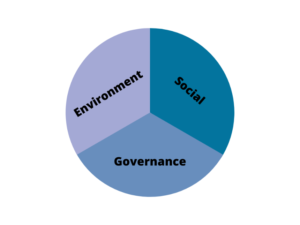ESG reporting is a criterion that considers the integrated social and environmental awareness of a company on three bases:
- Environmental (What effect do company operations have on the environment?)
- Social (The impact of an organization’s operations on its employees and communities).
- Governance (What a firm performs and how the organization is run?).
ESG Reporting is a score that determines from specific factors linked to collections within an organization used in financial markets and by consumers to evaluate business behavior and forecast future performance.

Environmental, social, and governance (ESG) investing, also known as socially responsible investing, is becoming very popular progressively because The report gives awareness to the people about the companies they want to invest in. Its explosive growth is based on the much earlier Socially Responsible Investment (SRI) movement. ESG funds currently make over 10% of all fund assets worldwide. The most recent research report from the US SIF Foundation mentions that at the start of 2020, according to the ESG metrics, investors’ assets were $17.1 trillion, which was only $12 trillion 2 years earlier.
In recent years, ESG reporting has grown in popularity. This increased interest results from growth in global business risk and a stronger desire among investors for environmentally sound, socially conscientious, and long-term business investment options. However, ESG encounters several fundamental problems as well. These issues are related to achieving investment objectives and about to ESG rules. On the one hand, ESG criteria are used by banks and investment professionals to analyze business risk. In this situation, ESG is being used to assess a company’s ability to operate in an increasingly uncertain environment. Climate change, environmental degradation, increased regulatory requirements, economic uncertainty, population transitions, and threats to data privacy and security are among the issues. To resolve all the problems, companies make audits to assess all the upcoming concerns and the progress as well by the procedure of audit.
An ESG audit is a procedure that assesses a company’s operations, products, and services for environmental and social risks. The purpose of this audit is to identify any potential risks so that they can be addressed before they become problems. To different financial professionals, ESG investing means other things. Specific clients will have their own set of preferences. The definitions of environmental, social, and governance will differ from one financial institution to the next. It may also differ inside the institution, depending on the investors targeted. ESG reporting can be improved with the help of SylLab as SylLab can assist with compliance automation by providing tools that streamline compliance regardless of framework. SylLab can streamline the ESG process, generate reports, and conduct a gap analysis. Our team of experts is available to those seeking advice.
The three primary aspects in determining the social impact of a company’s investments and business practices are environmental, social, and governance (ESG) standards are called ESG readiness. ESG reporting is never static, and the environment is continuously changing, which requires an ESG continuous audit solution that will benefit budgeting and preparing reports. Other essential responsibilities are to ensure that basic internal controls and auditing standards are working effectively. ESG audits help all benefit investors, the public, and the company. Because the public looks for the products and services from companies with strong social, environmental, and governance practices, ESG audit helps their search.
Finally, by putting in the effort to share its beliefs and knowledge through ESG reports, a company demonstrates that it is serious about the challenges and provides a framework for the responsibility that creates confidence. This is significant because, in the future, organizations will increasingly rely on trust to earn customer loyalty.

